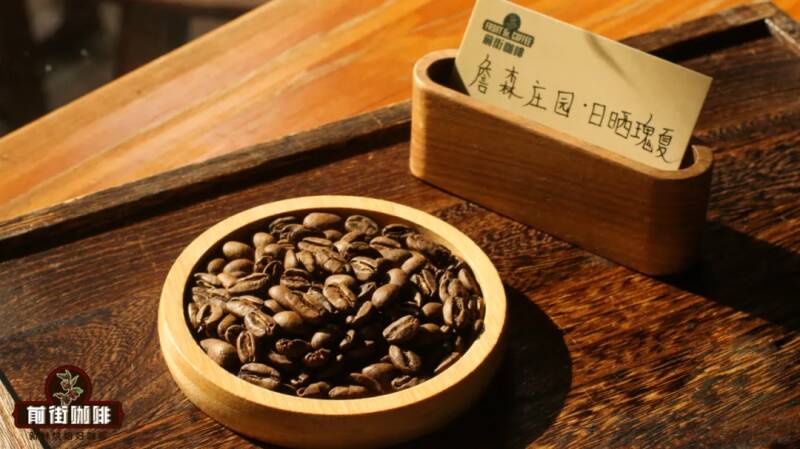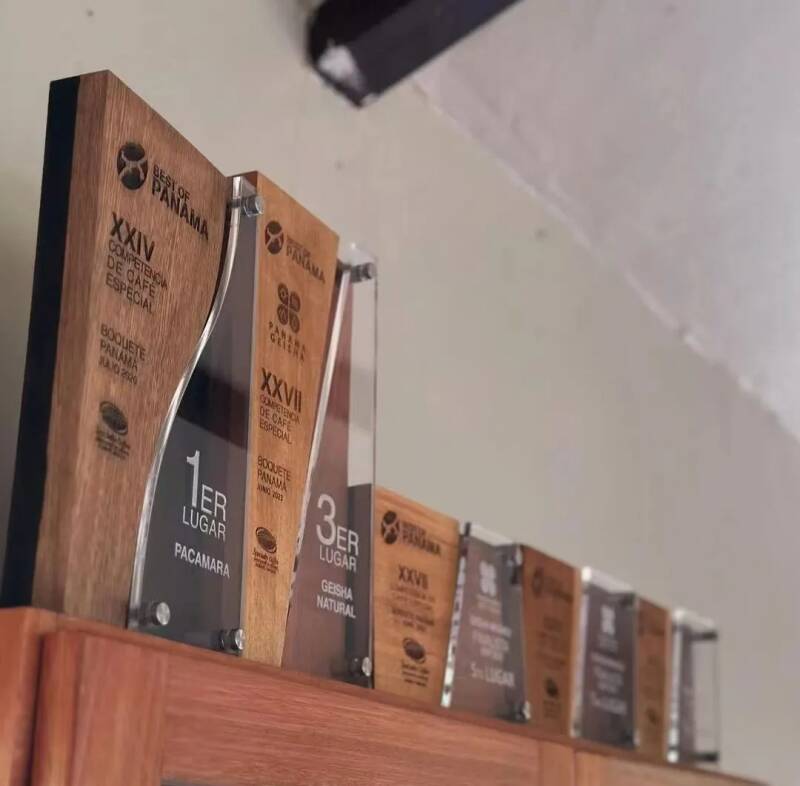Panama BOP award-winning Jensen Manor What is rose summer coffee? The difference between Jensen Manor and Emerald Manor?

Front Street Coffee: Panamanian Jensen Manor # 364 Summer Rose country: Panamanian production area: Walken production area Jason Manor plot: Alps: 1700 meters above sea level: rose summer treatment: sun flavor: grape juice, berries, fermented wine, plum, preserved fruit, pineapple
Janson Farms, a treasure estate that has been on the list of BOP winners for years since it made its debut at Best Panama in 2013. In recent years, Jensen Manor has not only become one of the best in Panamanian summer because of its excellent coffee quality, but also is loved by many professional players because of its exquisite taste spectrum, and is used as an important part of the show. it also makes the name "Jensen Manor" appear frequently on the international stage. Next, Qianjie takes you on a tour of this famous manor in the summer of Panama.

As a family-run farm that has been passed on for three generations, the story of Jensen Manor can be traced back to the beginning of the last century. In 1926, a 21-year-old young man Carl Axel Janson (Carl Exer Jansen) came to Panama from Sweden. He was soon fascinated by the different natural scenery and pleasant climate there. Looking forward to the countryside, he decided to emigrate with his wife, Margaret, to the Wakan Heights of Chiriki province, where he bought a cattle farm to start a dairy business.
Until the middle of, Carl and his family, with the help of agricultural experts, assessed the garden and realized that the volcanic soil, altitude, climate and environment were suitable for growing coffee trees, so in 1989, Mr. Carl and his sons (Michael, Carl, Ricardo and Peter) founded the now award-winning Jensen Coffee (Jensen Coffee) and officially entered the coffee field. With the continuous improvement of the farm facilities, the Jensen family set up a processing plant specially designed for the production of boutique coffee in 1993, exploring everything about coffee, including seed selection, cultivation, planting, picking, post-processing, and so on.
In 2003, the Emerald Manor became famous in World War I, and the rose summer of T2722 became a hot local variety in Panama, and all farmers scrambled for seeds, and the Jensen family was no exception. The second generation of landowners, who had taken over the farm business at that time, began to introduce green roses to their plantations for trial planting, laying the groundwork for becoming one of the most famous estates in Panama. At present, this famous manor, which has been in contact with coffee for more than 30 years, has not only the well-known Rose Summer, but also Kaduai, Kaddura, Pakamara and so on.
Located near the Talamanca Mountain Mountains in the westernmost part of Panama, Jensen Manor currently has two coffee growing areas: the lagoon block (Hacienda las Lagunas) and the Alps block (Los Alpes), which are located on the high-altitude slopes of Volc á n Tisingal and Volc á n Bar ú, respectively.
The lagoon block, west of Baru, takes its name from a nearby lake. It not only has fertile volcanic soil, but also has a number of natural springs to irrigate crops, and coffee trees are mostly planted at elevations of 1350 to 1400 meters.
The Alpine block, near the northwest of the Balu volcano, is located on the edge of the Tisingal volcano in the higher Taramanca Mountains, bordering the La Amisad International Park (La Amistad) in Panama, and is a UNESCO World Heritage site. Under the inherent advantages of warm ocean currents, springs, wetlands and volcanic soil, this primeval forest has become an important habitat for all kinds of birds and wildlife, as well as an ideal place for Rosa Rosa.
When collecting information, Qianjie found that, unlike other famous Panamanian estates such as Jade and Arida, Jensen Manor is not only engaged in animal husbandry and coffee farming, but also a very hospitable tourist destination. Not only can you explore everything about coffee, but you can also go boating in the lake near the farm and ride horses on the beautiful hillside. not only that, members of the Jensen family have specially built a Jensen Cafe for visitors. Just imagine, who doesn't want a four-dollar Jensen rose?
Qianjie noticed that the logo designed by the Jensen family is very simple, but with a few lines to show people its most representative information: primeval forests and wild bird habitats. Whether in farm management or in the boutique coffee sector, the Jensen family has always given priority to the concept of "quality production and harmonious development". Especially for the protection of nature and water resources, Carl and his family can be regarded as a model of the industry.
In order to resist the invasion of pests and protect the animals and plants that depend on the region, the Jensen family separated the virgin forest from the plantation and focused on avoiding products such as pesticides, pesticides and herbicides. Instead, they rely on enzyme microbes to maintain nutrient balance in the soil. In addition, the manor uses solar energy and recycled water to provide reuse resources for coffee processing, and the remaining peel and pulp will be organically treated into fertilizer for coffee trees.
Like many famous Panamanian villas, half of the coffee trees in Jensen Park are rosy summer varieties, and each batch launched by the Jason family has a number, which is an independent batch number developed by the landowner in order to achieve the complete traceability of each batch of beans, such as the Jensen Rose Summer lot#364, which was started on the front street this year, comes from the Alps and is processed in the sun.
Generally speaking, most farms use ordinary sacks to transport coffee fruit after harvest, while Jensen Manor uses crates to keep it in crates, because this minimizes the squeezing of the fruit and the loss of fruit juice. Jensen Manor will first screen the harvested fruit, then put it on the drying net and spread it out to be baptized by the sun. after about 27-30 days, the fruit will be shelled until only about 12% of the water content is left, and then sent to the warehouse for storage until the exit. In order to provide the best rest space for coffee cherries, the Jensen family also added a raw bean warehouse with temperature and humidity control for the processing plant, while closely monitoring the ph value of coffee cherries to ensure the consistency of each batch.
Considering that the rosy summer of Panama is often full of delicate and complex aromas of flowers and fruits, the front street baker chose medium-shallow baking to present this Jensen sun rose summer. After four days of exhaust and rest, the front street can't wait to taste it. So the beans were tasted in the form of cup test.
Dry aroma: fermented wine, raisin, cherry, wet aroma: wine heart chocolate, cranberry flavor: pineapple, fermentation, ripe fruit, preserved fruit, elegant floral aroma, berry, grape juice
-END-
Important Notice :
前街咖啡 FrontStreet Coffee has moved to new addredd:
FrontStreet Coffee Address: 315,Donghua East Road,GuangZhou
Tel:020 38364473
- Prev

How does the concentration of espresso affect? What does shot mean? How to say strong coffee?
Maybe he wants to consume more caffeine, or he may want to drink a stronger coffee flavor. All in all, there will always be some customers in the coffee shop who have a higher demand for coffee strength from time to time. However, since some guests and friends do not understand the field of coffee (and there is no need to), they do not know that coffee has a Sh plus.
- Next

Shoulder to shoulder! The coffee exhibition became a national gathering without threshold!
▲ Click to pay attention| Daily Boutique Coffee Culture Magazine Coffee Workshop Recently, an international coffee exhibition was held in Beijing, attracting countless coffee lovers. Some of them want to communicate with professionals, some want to find coffee beans that suit the taste, and some want to learn about coffee appliances and equipment. As a result, many people took advantage of
Related
- What grade does Jamaica Blue Mountain No. 1 coffee belong to and how to drink it better? What is the highest grade of Blue Mountain coffee for coffee aristocrats?
- What are the flavor characteristics of the world-famous coffee Blue Mountain No. 1 Golden Mantelin? What are the characteristics of deep-roasted bitter coffee?
- Can I make coffee a second time in an Italian hand-brewed mocha pot? Why can't coffee be brewed several times like tea leaves?
- Hand-brewed coffee flows with a knife and a tornado. How to brew it? What is the proportion of grinding water and water temperature divided into?
- What is the difference between Indonesian Sumatra Mantinin coffee and gold Mantinin? How to distinguish between real and fake golden Mantelin coffee?
- What does bypass mean in coffee? Why can hand-brewed coffee and water make it better?
- Unexpected! Ruixing Telunsu lattes use a smoothie machine to foam milk?!
- % Arabia's first store in Henan opens into the village?! Netizen: Thought it was P's
- Does an authentic standard mocha coffee recipe use chocolate sauce or powder? Mocha Latte/Dirty Coffee/Salty Mocha Coffee Recipe Share!
- What is the difference between Vietnam egg coffee and Norway egg coffee? Hand-brewed single product coffee filter paper filter cloth filter flat solution!

